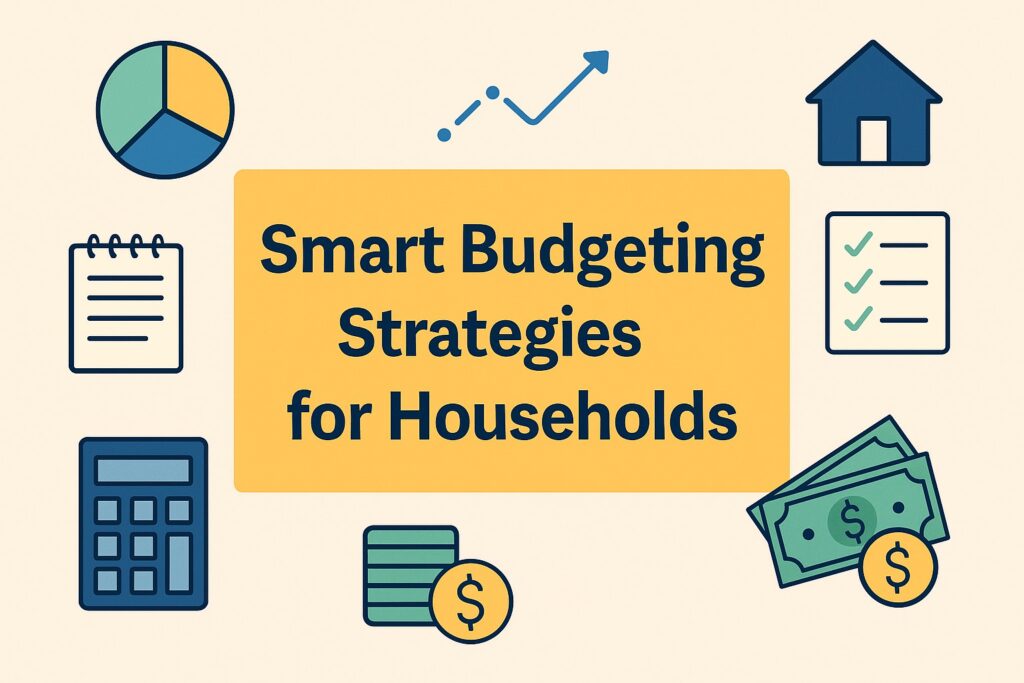Budgeting doesn’t have to be hard. In fact, creating a smart household budget can lead to more freedom, fewer money fights, and long-term financial peace. Whether you’re managing income, cutting costs, or saving for future goals, these smart budgeting strategies will help you stay on track.
1. Understand Your Income and Expenses
Start with the basics: track how much money is coming in versus going out. Use a Digital Budget Tracker like our free Smart Money Tracker to log every income and expense for 30 days.
👉 Pro Tip: Use tools like Mint or YNAB (You Need A Budget) for automatic tracking and alerts.
2. Set Clear Financial Goals
Whether it’s saving for a vacation, buying a home, or building an emergency fund, budgeting without goals is like driving without a destination.
🎯 Examples of Common Household Goals:
- Pay off credit card debt
- Build a 3–6 month emergency fund
- Save for kids’ education (use a 529 Plan)
- Invest for retirement (Roth IRA vs Traditional IRA)
See our goal-setting workbook →
3. Use the 50/30/20 Budgeting Rule
This popular strategy divides your income into:
- 50% Needs (rent, groceries, utilities)
- 30% Wants (entertainment, dining out)
- 20% Savings & Debt Repayment
Read how this fits into our Mini Budget Course →
4. Cut Unnecessary Spending
Audit your subscriptions, impulse buys, and dining expenses. Consider:
- Canceling unused subscriptions via Truebill
- Cooking meals at home (check out Budget Bytes for meal ideas)
- Buying generic instead of name brands
5. Automate Your Savings
Set up automatic transfers to your savings account after each paycheck. Even small amounts add up over time.
💡 Bonus Tip: Use high-yield savings accounts like those from Ally Bank or Marcus by Goldman Sachs.
6. Plan for Irregular Expenses
Don’t let birthdays, car repairs, or school fees ruin your budget. Add a “sinking fund” category to your budget.
📘 Download our free Sinking Fund Tracker → www.abusparks.com/tools
7. Involve the Whole Family
Budgeting is a team sport. Use budget meetings to discuss money openly with your partner or kids.
👨👩👧👦 Family-Friendly Resources:
8. Monitor and Adjust Monthly
Your budget should evolve with your life. At the end of each month:
- Compare planned vs. actual expenses
- Adjust next month’s budget accordingly
- Celebrate your wins (small or big)
📈 Need help reviewing your monthly budget? Join our free coaching sessions → Smart Money Moves Coaching
9. Use Envelopes or Cash Stuffing (for Discipline)
Cash-based budgeting is a great way to prevent overspending. Try physical cash envelopes or digital apps like Goodbudget.
10. Don’t Forget to Budget for Fun
Deprivation leads to burnout. Make space for affordable fun like:
- Local free events (Check Eventbrite)
- Movie nights at home
- Family game nights
Final Thoughts
Smart budgeting is more than just cutting costs—it’s about aligning your spending with your values. Whether you’re just starting out or refining your strategy, these tips will help your household thrive financially.
📌 Resources Recap:
- Free Digital Budget Tracker
- Smart Money Mini Course
- Family Finance Hub
- Smart Money Coaching
- Mint
- YNAB
- Consumer Finance Tools
Let’s Talk:
💬 What’s the biggest challenge you face when budgeting as a household? Drop your thoughts in the comments or send us a message on @abusparksofficial.
